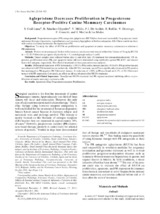Aglepristone decreases proliferation in progesterone receptor-positive canine mammary carcinomas
Autor
Guil-Luna, Silvia
Sánchez Céspedes, Raquel
Millán, Yolanda
De Andrés, Francisco Javier
Rollón, Eva
Domingo, Victor
Guscetti, Franco
Martín de las Mulas González-Albo, Juana
Editor
WileyFecha
2011Materia
ApoptosisDog
Progesterone receptor
Proliferation
METS:
Mostrar el registro METSPREMIS:
Mostrar el registro PREMISMetadatos
Mostrar el registro completo del ítemResumen
Progesterone receptor (PR) antagonist aglepristone (RU534) has been used successfully for pregnancy termination and therapy of pyometra, vaginal tumors, and mammary hyperplasia in bitches and queens. All of these conditions share with canine mammary carcinomas the expression of PR. Objectives: To study the effect of RU534 on proliferation and apoptosis in canine mammary carcinomas in relation to PR expression. Animals: Twenty-seven nonspayed bitches with mammary carcinomas were treated with either 2 doses of 20mg/kg RU534 (n = 22, RU534-treated group) or oil placebo (n = 5, control group) on days 1 and 8. Methods: Tumor samples were collected before (day 1) and after (day 15) treatment for immunohistochemistry. PR expression, proliferation index (PI), and apoptotic index (AI) were determined using antibodies against PR, Ki67, and cleaved lamin A/C antigens, respectively. The effect of treatment on these parameters was analyzed. Results: Differential expression of PR between day 1 (59.1% PR-positive tumors) and day 15 (36.4% PR-positive tumors) was observed in RU534-treated tumors exclusively. After RU534 treatment, mean PI was significantly decreased in PR-positive but unchanged in PR-negative RU534-treated tumors. A reduction of ≥20% in PI was found in 61.5% of RU534-treated tumors with PR expression. Conversely, no effect on AI was observed after RU534 treatment. Conclusions and Clinical Importance: Neoadjuvant RU534 treatment had PR expression-related inhibiting effects on proliferation of canine mammary carcinoma cells.

